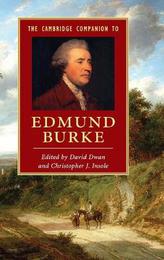
|
The Cambridge Companion to Edmund Burke
Hardback
Main Details
| Title |
The Cambridge Companion to Edmund Burke
|
| Authors and Contributors |
Edited by David Dwan
|
|
Edited by Christopher Insole
|
| Series | Cambridge Companions to Literature |
|---|
| Physical Properties |
| Format:Hardback | | Pages:279 | | Dimensions(mm): Height 235,Width 152 |
|
| ISBN/Barcode |
9781107005594
|
| Classifications | Dewey:320.092 |
|---|
| Audience | | Professional & Vocational | |
|---|
| Illustrations |
Worked examples or Exercises; Printed music items
|
|
Publishing Details |
| Publisher |
Cambridge University Press
|
| Imprint |
Cambridge University Press
|
| Publication Date |
22 October 2012 |
| Publication Country |
United Kingdom
|
Description
Edmund Burke prided himself on being a practical statesman, not an armchair philosopher. Yet his responses to specific problems - rebellion in America, the abuse of power in India and Ireland, or revolution in France - incorporated theoretical debates within jurisprudence, economics, religion, moral philosophy and political science. Moreover, the extraordinary rhetorical force of Burke's speeches and writings quickly secured his reputation as a gifted orator and literary stylist. This Companion provides a comprehensive assessment of Burke's thought, exploring all his major writings from his early treatise on aesthetics to his famous polemic, Reflections on the Revolution in France. It also examines the vexed question of Burke's Irishness and seeks to determine how his cultural origins may have influenced his political views. Finally, it aims both to explain and to challenge interpretations of Burke as a romantic, a utilitarian, a natural law thinker and founding father of modern conservatism.
Author Biography
David Dwan is a lecturer in English at Queen's University Belfast. He is author of The Great Community: Culture and Nationalism in Ireland (2008) and has written a range of articles on intellectual history and modern literature. Christopher Insole is Senior Lecturer in Theology and Ethics at the University of Durham, UK. He is the author of The Politics of Human Frailty: A Theological Defence of Political Liberalism (2005) and has written articles on Burke, Kant, philosophy of religion, epistemology and intellectual history.
Reviews'[This book] aims to disentangle Burke from his many contexts and for the most part it succeeds impressively.' The Times Literary Supplement 'The Cambridge Companion to Edmund Burke is a book for our time: it should help undergraduates know what is expected of them in their exams; it is a helpful supplement to Burke's Reflections on the Revolution in France but not a replacement for Burke's own texts.' Edward Andrew, The European Legacy
|